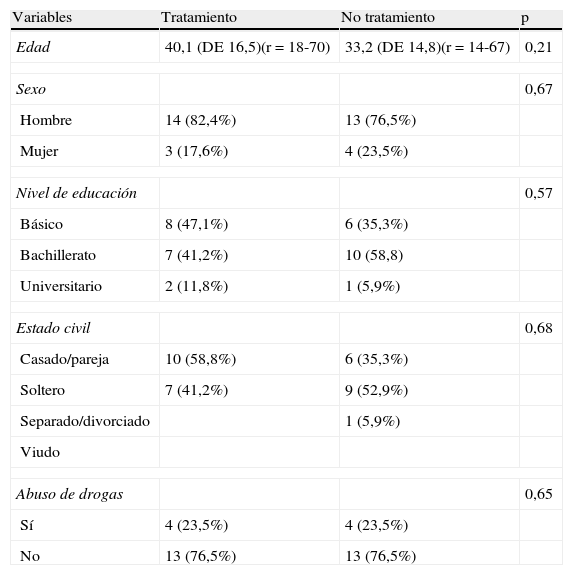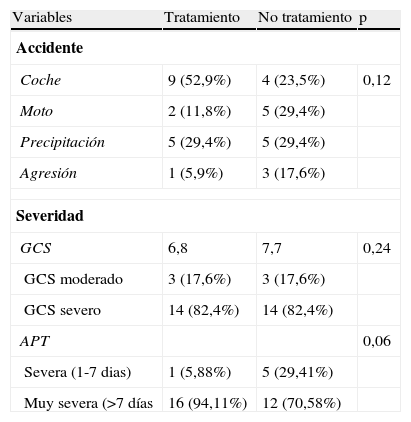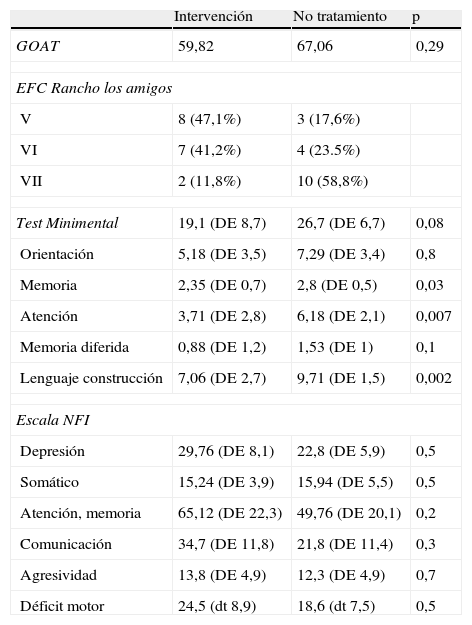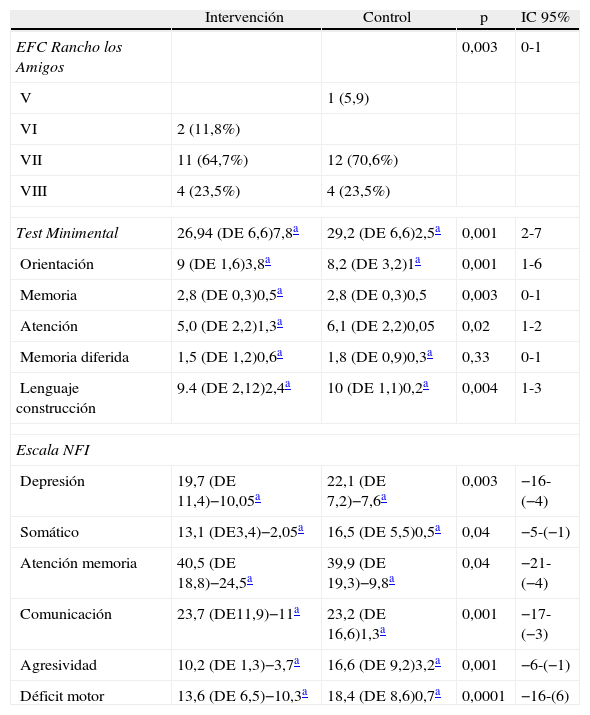El objetivo es determinar el impacto del tratamiento de rehabilitación cognitiva, sobre el déficit cognitivo y la capacidad funcional, en pacientes con traumatismo craneoencefálico (TCE).
Material y métodoDiseño del estudio cuasiexperimental, con grupo control.
Sujetos del estudio34 pacientes con TCE moderado o severo que cumplen los criterios de inclusión. Los pacientes fueron asignados a 1) grupo experimental: realizan tratamiento cognitivo, con programa de estimulación cognitiva SMARTBRAIN, y rehabilitación funcional, o a 2) grupo control: realizan programa de tratamiento de rehabilitación funcional. La duración del tratamiento fue de 4 meses.
Instrumentos de medidasLa valoración cognitiva se hace por el test Minimental y la escala Neurobehavioral Functioning Inventory, y son clasificados según la escala de nivel de función cognitiva Rancho los Amigos. La valoración funcional se realiza con el Functional Independence Measure (FIM), en el momento de la inclusión en el estudio, y al finalizar el tratamiento.
ResultadosSe observó recuperación del déficit cognitivo, en el grupo experimental, con valores superiores en el test Minimental (p<0,001; IC 95%: 2-7) y en cada una de las áreas que este instrumento evalúa. También se observaron diferencias en los valores obtenidos en las 6 subescalas de la escala Neurobehavioral Functioning Inventory, principalmente en atención, memoria (p<0,04; lC 95%: −21-−4), y comunicación (p<0,001; IC 95%: −17-−3). El grupo experimental también presentó valores superiores en la subescala cognitiva del FIM (p<0,008; IC 95%: 1-6), pero no en el nivel funcional, valorado por el FIM.
ConclusionesEn pacientes con TCE, el tratamiento cognitivo mejora la recuperación del déficit cognitivo, no existiendo deferencias en los resultados funcionales de estos pacientes.
This study has aimed to determine the impact of Cognitive Rehabilitation treatment on cognitive deficits and functional capacity in patients with traumatic brain injury (TBI).
Material and methodThe study has a quasi-experimental design, with a control group.
Study subjects34 patients with moderate or severe TBI who fulfilled the inclusion criteria. The patients were assigned to 1) an experimental group: cognitive therapy was performed using the SMARTBRAIN stimulation cognitive program, and functional rehabilitation, 2) control group: functional rehabilitation treatment program was performed. The treatment duration was 4 months.
Measurement instrumentsThe cognitive assessment was performed using the Minimental test, Neurobehavioral Functioning Inventory Scale and classification was done according to the Rancho de los Amigos levels of cognitive functioning scale. Functional assessment was performed using the Functional Independence Measure (FIM) both during enrolment in the study and at the end of the treatment.
ResultsRecovery of cognitive deficit was observed in the experimental group, with high values in Minimental test (P<.001; 95% CI: 2-7) and in each of the areas evaluated by this instrument. Differences were also observed in the values obtained in the six subscales of Neurobehavioral Functioning Inventory scale. These were mainly in attention, memory (P<.04, 95 CI: −21-−4%) and communication (P<.001; 95% CI: −17-−3). The experimental group also had high values in the FIM cognitive subscale (P<0,008; 95% CI: 1-6), but not at the functional level, valued by FIM.
ConclusionsIn TBI patients, cognitive treatment improves recovery of cognitive deficit. There are no differences in functional outcomes of these patients.
Artículo
Comprando el artículo el PDF del mismo podrá ser descargado
Precio 19,34 €
Comprar ahora












